
 Dialogue 03Empowerment of Every Employee through Mutual Understanding
Dialogue 03Empowerment of Every Employee through Mutual Understanding
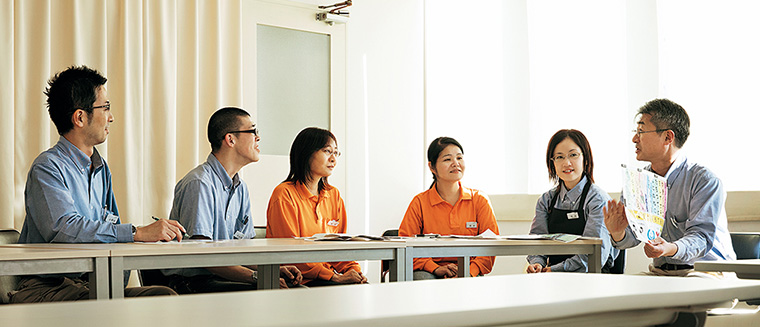
From left: Komiyama, Oyamada, Arai, Nishimoto, Sugita (Sign language interpreter), Hori (Moderator and sign language interpreter)
MARUI KIT CENTER CO., LTD., is a special subsidiary of MARUI GROUP that advances initiatives for providing employment opportunities to people with disabilities that date back to 1992. This company's differently abled employees utilize various techniques to overcome the challenges faced in their work while fostering mutual understanding as they work together. Using the common language of sign language and picture boards, MARUI KIT CENTER employees sat down to discuss the issues faced in their daily work and techniques used to overcome them as well as their motivation toward work.

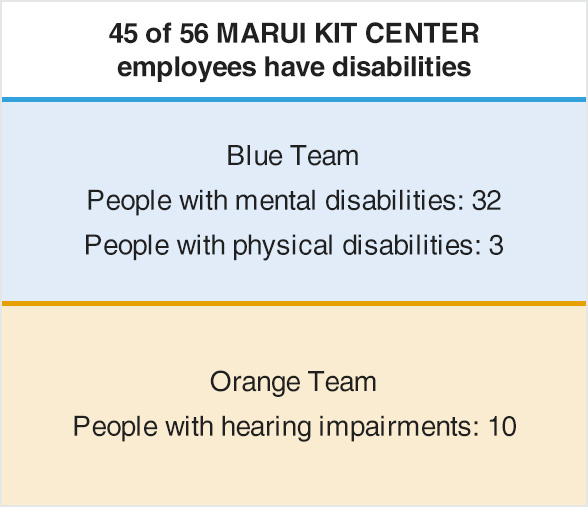
Comfortable Workplace Built on Understanding of Each Other's Area of Weakness
Oyamada: I have a mental disability. Apparently, I was born with minor cerebral palsy. When I toured MARUI KIT CENTER three years ago, the lively atmosphere gave the impression that it would be a comfortable environment for me to work in, and I thus chose to join.
Nishimoto: I have a hearing impairment. I originally worked in a different company located here, in the Toda Product Center, but I decided to join KIT CENTER 11 years ago.
Komiyama: When I was 24, I suffered from cerebral hemorrhaging, which resulted in paralysis in the left half of my body. I had originally joined MARUI GROUP 10 years ago out of an interest in fashion. In October 2016, I transferred to KIT CENTER.
Arai: I have a hearing impairment. I was a homemaker for several years, but I joined KIT CENTER 11 years ago with the aim of returning to the workforce. This company offers an incredibly comfortable workplace environment in which everyone strives to compensate for each other's area of weakness.
Oyamada: One benefit of joining KIT CENTER was learning that there were areas of work I could handle as well as areas in which I was weak.
Hori: You are referring to our unique license system if I am correct. A detailed checklist is used to identify which types of work each employee feels that they cannot perform and what their areas of weakness are.
Komiyama: I can only use my right hand, but my coworkers joined me in thinking of ways I could perform my work more smoothly with only one hand.
Sugita: In the past, we had an employee who indicated on the license system checklist that his work took a long time to do. This employee was left-handed, but he had been trained by a right-handed individual, which made it difficult for the employee to use the same techniques. When we learned what was causing his work to take so long, we quickly put our heads together to think of a way for a left-handed person to perform the work efficiently.
Arai: I cannot hear, and I am therefore very sensitive about what goes on around me. At KIT CENTER, there are many employees that get distracted by their surroundings, so everyone faces the same direction when they work. It is very nice to be able to focus only on the work in front of me.
Sugita: An organized work station is incredibly important. If the necessary items are not always in the same place, even work that one is normally able to perform can become an area of weakness. At KIT CENTER, the locations for all items are set.
Oyamada: The recipients of deliveries are now written in alphabet letters and numbers as opposed to kanji characters. This has helped prevent mistakes and sped up work.
Hori: It seems that alphabet letters and numbers were easier to recognize than kanji characters. One trait of KIT CENTER is how it incorporates many such ideas and techniques. A little consideration here and there can remove barriers, making work go smoother and improving productivity.
Nishimoto: People that come up with good ideas receive "little consideration awards." At work, we are always sharing ideas about how to remove the barriers we may face.
Shift in Common Language from Writing to Sign Language
Hori: I am sure everyone's experience has been different, but have you faced any issues when working with the other employees?
Arai: At first, I did not know how to interact with Blue Team when working with them because sign language was not an option.
Nishimoto: I felt the same. I worried much over how I would tell Blue Team if an issue arose, how I would get my point across.
Sugita: How do you overcome this language barrier between Blue Team and Orange Team?
Oyamada: The leader of the product inspection team I belong to is from Orange Team, so I used a writing board at first. However, communicating by writing takes time and makes it hard to really understand one another. I therefore decided to learn sign language.
Arai: I am the leader of the office service team. Many people at KIT CENTER are able to use sign language, which really makes work progress smoothly.
Hori: Mr. Oyamada has an advanced sign language license from our internal system. I understand that you also received third rank certification in the national sign language certification test.
Oyamada: I still use a writing board to communicate very detailed points, but I am able to get by with sign language for almost everything else.
Arai: People that are not good at sign language sometimes use both a writing board and a picture board.
Nishimoto: People with hearing impairments are usually seen as having a disability. However, this disability disappears when they are able to communicate with sign language. I think that the real disability arises from a lack of common language when people who can hear work with those who cannot.
Oyamada: People from Blue Team have people from Orange Team teach them sign language on a daily basis. Everyone is cooperating so that we can quickly become able to use sign language effectively for work communication.
Motivation from Knowing You Are Helping
Hori: What have you enjoyed about your work and what has made you happy?
Oyamada: When I help out a coworker, it makes me happy to hear them say "thank you." I want to be someone everyone relies on, so I am trying to learn the work of both the product inspection team and the delivery center.
Arai: When I am asked to make an urgent delivery and I make it on time, I am always happy to receive an email thanking me for the quick response. After making a delivery and seeing the products on display in stores, I become very happy. This experience has really hit home how much we are helping out.
Nishimoto: When I was on the product inspection team, employees from Group company MOVING would often ask me to help out when they were busy. Product inspectors handle lots of products in a single day, and when I accomplish my goal, it really makes me feel that I am being useful.
Komiyama: I am still in training, but I get praised when I finish my work on time. I really feel like KIT CENTER is a comfortable place to work. As I am on the supply team, I do not have the opportunity to interact with customers directly. However, I go about my work with the belief that I am aiding the Company by helping staff across Japan perform their work more easily.
Arai: As a leader, I aim to be considerate of our various needs and develop methods of facilitating our work in order to make the workplace environment even more comfortable.
Nishimoto: In the future, I hope to work in a different department at MARUI GROUP so I can learn new skills.
Komiyama: I only transferred to KIT CENTER just recently. I therefore want to get accustomed to the work as soon as possible so I can become a jack-of-all-trades capable of helping out in various positions.
Hori: Everyone here is so very passionate about their work. At KIT CENTER, I do not feel that employees are impeded by barriers, such as from being unable to hear or having trouble communicating.
-
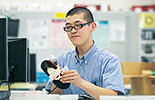
- Yuta Oyamada
-
Product Inspection Team
MARUI KIT CENTER CO., LTD. -
Blue Team
(mental disability)
-

- Megumi Arai
-
Office Service Team Leader
MARUI KIT CENTER CO., LTD. -
Orange Team
(hearing impairment)
-

- Yukari Nishimoto
-
Delivery Center Leader
MARUI KIT CENTER CO., LTD. -
Orange Team
(hearing impairment)
-
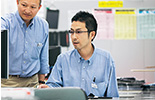
- Takashi Komiyama
-
Supply Team
MARUI KIT CENTER CO., LTD. -
Blue Team
(physical disability)
-
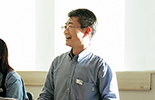
- Mitsuru Hori
-
Work Leader
MARUI KIT CENTER CO., LTD.
(Moderator and sign language interpreter)
-
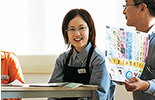
- Yuka Sugita
-
Work Leader
MARUI KIT CENTER CO., LTD.(Sign language interpreter)
Stakeholder Engagement
-
- Dialogue 01
- A Flourishing and Inclusive Society Offering Happiness to All
-
- Dialogue 02
- Potential of MARUI GROUP's Business from the Perspective of Inclusion
-
- Dialogue 03
- Empowerment of Every Employee through Mutual Understanding
-
- Dialogue 04
- Multi-Stakeholder Perspective Enabling Challenges into Unexplored Realms
This sustainability website is designed to accommodate people with color blindness.







